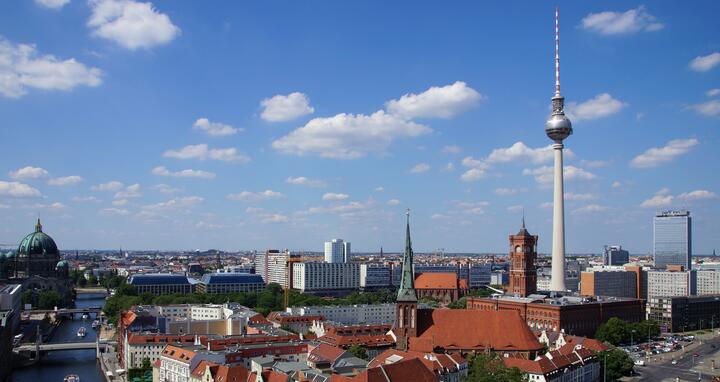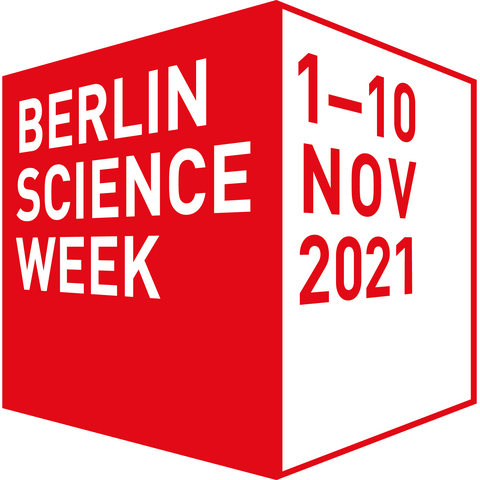Berlin Science Week: Covid, dialogue and critical thinking
From November 1st to 10th, 2021, Berlin invites everybody to Berlin Science Week, the international festival for curious people of all ages. The Max Delbrück Center for Molecular Medicine in the Helmholtz Association (MDC) offers a diverse program, in many cases together with partners. In science shows, panel discussions and hands-on experiments, MDC researchers hope for an inspiring exchange with everyone who wants to immerse themselves in biomedicine. An overview:
Berlin PostDoc Day 2021 at the Buch Campus (with FMP)
The Berlin PostDoc Day is organized by postdocs from the Max Delbrück Center for Molecular Medicine (MDC) and the Leibniz-Forschungsinstitut für Molekulare Pharmakologie (FMP) in Berlin. It is a great chance for postdocs at any level of experience and last-year PhD students to present their science in talks or posters, get to know each other and expand their network. The best talks will be awarded great prizes! In addition to scientific sessions, the PostDoc Day offers talks by industry sponsors and seminars with communication experts. The keynote address will be given by Professor Uri Alon from the Weizmann Institute of Science.
Thursday, 4 November from 9 a.m. to 6 p.m.: Public PostDoc Day at Campus Buch, Robert-Rössle-Strasse 10, Berlin, MDC.C. Registration required: https://www.mdc-berlin.de/de/postdoc_day_2021.
Panel Discussion: Cardiovascular Health in the Time of COVID-19 (with BIH and Springer Nature)
COVID-19, caused by a severe acute respiratory syndrome coronavirus 2 (SARS-CoV-2), has become a global pandemic that has affected the lives of the entire human population. The panel, composed of Berlin-based experts in basic, translational and clinical science focused on cardiovascular disease and immunology, will discuss three key aspects:
How are pre-existing cardiovascular conditions associated with worse outcomes and increased risk of death in patients with COVID-19? How can COVID-19 itself induce cardiovascular disease, such as venous thromboembolism, high blood pressure, acute coronary syndrome, myocardial injury, and arrhythmia? And how we can minimize all these risks by vaccination?
Panelists:
- Professor Holger Gerhardt, MDC, BIH and DZHK (German Centre for Cardiovascular Research)
- Professor Michael Potente, BIH and MDC / Professor Leif Erik Sander, Medical Clinic for Infectiology and Pneumology, Charité - Universitätsmedizin Berlin
- Professor Birgit Sawitzki, BIH and Institute for Medical Immunology, Charité - Universitätsmedizin Berlin
- Dr. Emanuel Wyler, Max-Delbrück-Center for Molecular Medicine in the Helmholtz Association (MDC)
Moderation: Dr. Vesna Todorovic, Nature Cardiovascular Research
Friday, 5 November, 6 p.m. to 8 p.m.
Livestream
The event will be held in English.
New methods for fewer animal experiments (with Einstein Centre 3R)
Insights into the new Einstein Centre 3R: Research on mini-organs, human tissue or multi-organ chips - modern technologies promise a future without animal testing. What is the current state of research? How do these methods work and what are their limits? A panel discussion with short film clips from the labs will address these and other questions. Learn how Berlin's scientists are working to change and improve research according to 3R - Replace, Reduce, Refine animal experiments.
On the panel, scientists from the new Einstein Center 3R will explain their research:
- Professor Michael Gotthardt, Max Delbrück Center for Molecular Medicine
- Professor Stefan Hippenstiel, Charité 3R
- Professor Christa Thöne-Reineke, FU Berlin
- Professor Jens Kurreck, TU Berlin
- Professor Tanja Schwerdtle, Bundesinstitut für Risikobewertung (BfR) / German Centre for the Protection of Laboratory Animals (Bf3R)
Friday, 5 November 2021, 12:00 to 1:30 p.m.: Public discussion at the Natural History Museum, Invalidenstasse. 43, Berlin.
Registration at registration@ec3r.org. You can also send questions to registration@ec3r.org before the event.
MDC booth in the museum: Lab Olympics with scientists
Pipetting, measuring, finding information – in our Lab Olympics you can try out how well you would be suited to everyday laboratory work. Of course, MDC scientists will also explain to you how they want to shape the medicine of the future with their projects: from new cancer therapies to corona research. And last but not least: a lab selfie is included.
Friday, 5 November - Saturday, 6 November 2021, 10 a.m. to 7:30 p.m., Natural History Museum, Invalidenstr. 43
Cell diagnostics of the future - laboratory meets teacher
In order for organs or living things to function, countless cells must communicate with each other, develop and specialize. To do this, they repeatedly retrieve different information from the genetic material. With new omics technologies such as single cell analysis, researchers can precisely observe on a large scale how cells and their interaction change in the course of diseases. Thanks to this precision, they can even see rare cell types like stem cells - which are therapeutically interesting. Anyone who wants to diagnose diseases earlier and treat them with precision must therefore look at the cellular level. With Dr. Patrick Maschmeyer and Dr. Leif Ludwig (MDC/BIH/Charité).
Wednesday, 10 November, 4 to 5:30 p.m.: Public training via Zoom | Registration required: https://www.mdc-berlin.de/form/labor-trifft-lehrer
Further information
The MDC is also involved in the two science shows "Blumen!" and "Real or Fake" and the discussion event on “Diversity instead of Uniformity” organized by Berlin Research 50. Sabrina Yasmin Geisberger (MDC) will receive the Marthe Vogt Award of the Forschungsverbund Berlin.
The complete MDC program at the Berlin Science Week
Contact
Jutta Kramm
Head of Communications
Max Delbrück Center for Molecular Medicine in the Helmholtz Association (MDC)
+49 30 9406-2140
jutta.kramm@mdc-berlin.de or presse@mdc-berlin.de
- Max Delbrück Center for Molecular Medicine (MDC)
-
-
The Max Delbrück Center for Molecular Medicine in the Helmholtz Association (MDC) is one of the world’s leading biomedical research institutions. Max Delbrück, a Berlin native, was a Nobel laureate and one of the founders of molecular biology. At the MDC’s locations in Berlin-Buch and Mitte, researchers from some 60 countries analyze the human system – investigating the biological foundations of life from its most elementary building blocks to systems-wide mechanisms. By understanding what regulates or disrupts the dynamic equilibrium in a cell, an organ, or the entire body, we can prevent diseases, diagnose them earlier, and stop their progression with tailored therapies. Patients should benefit as soon as possible from basic research discoveries. The MDC therefore supports spin-off creation and participates in collaborative networks. It works in close partnership with Charité – Universitätsmedizin Berlin in the jointly run Experimental and Clinical Research Center (ECRC), the Berlin Institute of Health (BIH) at Charité, and the German Center for Cardiovascular Research (DZHK). Founded in 1992, the MDC today employs 1,600 people and is funded 90 percent by the German federal government and 10 percent by the State of Berlin. www.mdc-berlin.de






